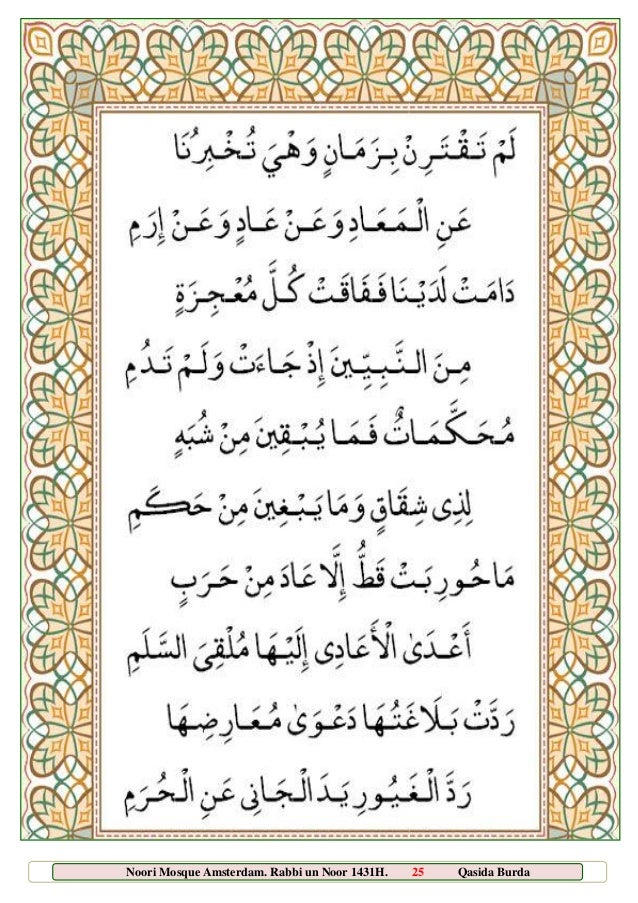

^ "Imam al-Busiri, The Mantle Adorned", Timothy Winter (Abdal Hakim Murad), (London: Quilliam Press, 2009).^ "BBC – Religions – Islam: al-Burda".– University of Bombay – Published by Taj Company Ltd". ^ "The poem of the scarf by Shaikh Faizullah Bhai B.^ "Anthology of Arabic Poems about the Prophet and the Faith of Islam Containing the Famous Poem of Al-Busaree".The founder of Wahhabism, Muhammad ibn Abd al-Wahhab, considered the poem to be idolatory ( shirk). 852 A.H.) both by reading the text out loud to his teacher and by receiving it in writing from a transmitter who heard it directly from Busiri himself. The Burda was accepted within Sunni Islam and was the subject of numerous commentaries by mainstream Sunni scholars such as Ibn Hajar al-Haytami, Nazifi and Qastallani It was also studied by the Shafi'i hadith master Ibn Hajar al-Asqalani (d.
#Qasidah burdah shareef in arabic full
They have sung the full poem in over 20 different styles. The full rendition of this famous poem has been produced by The Adel Brothers. The book was also translated into four different languages: Persian, Urdu, Punjabi and English by Dr. Arguably the most important translation of recent times is that by Timothy Winter into English. The poem has seen several different translations, into a variety of languages. It is known and recited by a large number of Sunni Muslims, ordinarily and on special occasions, such as Mawlid, making it one of the most recited poems in the world. Over 90 commentaries have been written on this poem and it has been translated into Hausa, Persian, Urdu, Turkish, Berber, Punjabi, English, French, German, Sindhi, Saraiki, Norwegian, Chinese (called Tianfangshijing), and other languages. This poem decorated Al-Masjid al-Nabawi (the mosque of Muhammad) in Medina for centuries but was erased but for two lines. It is memorized and recited in congregations, and its verses decorate the walls of public buildings and mosques.

Sunni Muslims have traditionally venerated the poem.

He said, "The one you wrote during your illness." On the road, I met a fellow spiritual wayfarer, who said to me, "I want you to give me a copy of the poem you wrote in praise of the Prophet, upon him be prayers and peace." I had told no one of my poem nor of anything I had been doing prior to that. He wiped over my face with his blessed hand and thrust upon me his cloak. During that time, while sleeping, I saw the Prophet, upon him and his family be prayers and peace. I was repeating it often, singing it, calling upon God through it, and seeking intercession with it. I began to contemplate writing a poem in the qasida form, and soon after, I did so as a way of interceding by it with the Messenger of God to God, the Exalted, hoping that he might heal me. The original Burdah is not as famous as the one composed by Imam al-Busiri even though Muhammad had physically wrapped his mantle over Ka'b not in a dream like in the case of Imam al-Busiri.Īl-Busiri narrated the circumstances of his inspiration to write the Burdah: Muhammad was so moved that he removed his mantle and wrapped it over him. He recited this poem in front of Muhammad after embracing Islam. īānat Suʿād, a poem composed by Ka'b bin Zuhayr was originally called as Al-Burdah. It is entirely in praise of Muhammad, who is said to have been praised ceaselessly by the afflicted poet, to the point that the Prophet appeared in a dream and wrapped him in a mantle or cloak in the morning the poet discovers that God has cured him. The poem whose actual title is al-Kawākib ad-durriyya fī Madḥ Khayr al-Bariyya ( الكواكب الدرية في مدح خير البرية, "The Celestial Lights in Praise of the Best of Creation"), is famous mainly in the Sunni Muslim world. Qasīdat al-Burda ( Arabic: قصيدة البردة, "Ode of the Mantle"), or al-Burda for short, is a thirteenth-century ode of praise for the Islamic prophet Muhammad composed by the eminent Sufi mystic Imam al-Busiri of Egypt. A verse from the Qaṣīdat al-Burda, displayed on the wall of al-Busiri's shrine in Alexandria


 0 kommentar(er)
0 kommentar(er)
